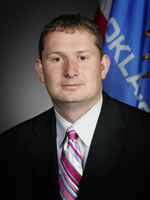In order to provide equal access and equal opportunity to people with diverse abilities, this site has been designed with accessibility in mind. Click here to view
Election Reform Bills Not Heard by Rules Committee – Corn Promises to Continue Reform Effort
 Sen. Kenneth Corn
Sen. Kenneth Corn
Legislation that would have limited the influence of special interests in Oklahoma political campaigns failed to receive a hearing prior to the February 21 deadline for approval of legislation in Senate committees.
Sen. Kenneth Corn filed three election reform measures, including the Oklahoma Clean Elections Act of 2008. All were assigned to the Rules Committee, where none were heard. Corn said he was disappointed but will use every possible avenue to advance the proposals through the legislative process.
“By approving these bills, we could have sent a message to the people that we work for them and not special interests,” said Corn, D-Poteau. “We need to have the courage to do the right thing and restore integrity to the process.”
Corn said he filed the legislation out of a concern that the average Oklahoman has been priced out of the political process. Corn said the costs of campaigning for a seat in the state Legislature have begun to spiral out of control, with candidates spending up to half a million dollars in Senate races.
Corn’s legislation would have placed caps on spending in legislative and statewide races and would have established the Citizens Clean Elections Fund as a funding source for qualified candidates. The proposals would have limited primary election spending to $10,000 for legislators, $80,000 for statewide elected offices and $380,000 for Gubernatorial candidates. The bills would have enacted similar reforms for judicial campaigns, and campaigns for Insurance Commissioner and Corporation Commissioner.
“As it stands now, candidates for Corporation Commissioner and Insurance Commissioner can take contributions from the very businesses they would be charged with regulating,” Corn said. “Along the same lines, judicial candidates shouldn’t have to go out and raise money from people who might come before them on the bench.”
Corn said he would continue working to enact election reform.
“Special interest groups shouldn’t have more influence in state government than working Oklahomans,” Corn said. “We need to ensure that the people have access to the system, and currently that isn’t the case. The average Oklahoman shouldn’t feel like they need to be wealthy to run for office.”
 Oklahoma Senate
Oklahoma Senate

